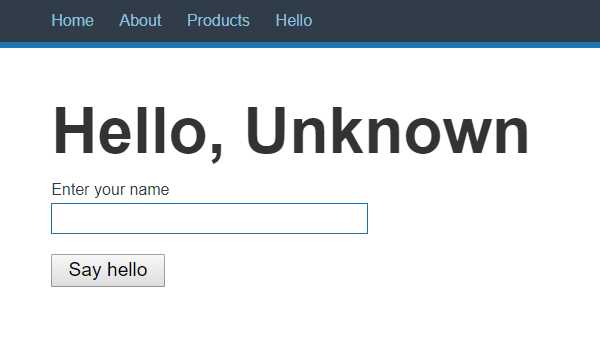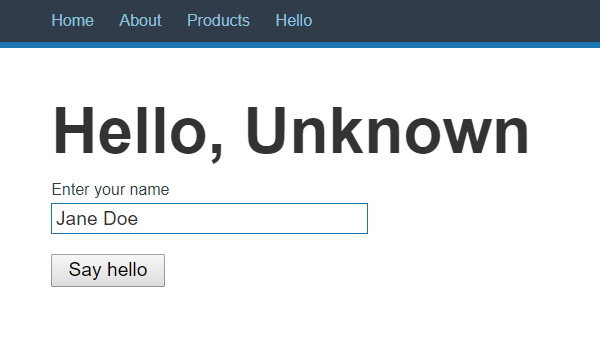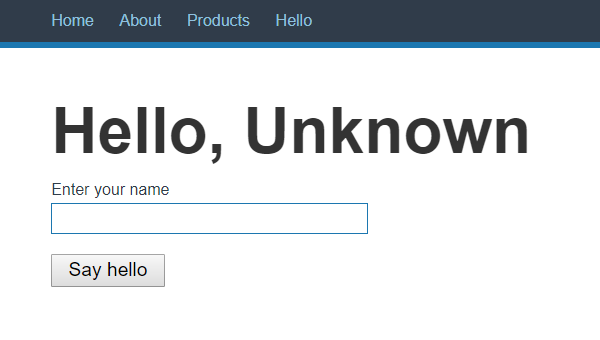Create a form
It's time to leave the product pages for a while. Instead, we are going to take a look at how the bluemvc-forms package can be useful when working with forms.
In this example, a simple form with a text field will be created. In the text field, the user can enter his or her name. On submitting the form, the page will greet the user with a "Hello" followed by the name.
Create the form page
Let's create a new page for the form.
Open Application/Controllers/IndexController.php and add the helloAction method:
/**
* The index controller class.
*/
class IndexController extends Controller
{
/**
* The index action.
*
* @return View The view for this action.
*/
public function indexAction(): View
{
$this->setViewItem('Title', 'My website');
return new View();
}
public function aboutAction(): View
{
$model = ['Name' => 'John Doe', 'Email' => 'info@example.com', 'Year' => 2018];
$this->setViewItem('Title', 'About this website');
return new View($model);
}
public function helloAction(): View
{
$name = 'Unknown';
$this->setViewItem('Title', 'Hello!');
return new View(['Name' => $name]);
}
}
Create a new file hello.twig in the directory Application/Views/Index/ with the following content:
{% extends "sitelayout.twig" %}
{% block content %}
<h1>Hello, {{ Model.Name }}</h1>
{% endblock %}
Open Application/Views/sitelayout.twig and add the "Hello"-link:
<div class="menu">
<ul>
<li><a href="/">Home</a></li>
<li><a href="/about">About</a></li>
<li><a href="/products/">Products</a></li>
<li><a href="/hello">Hello</a></li>
</ul>
</div>
Check the result
Open the url http://localhost/hello and check the result:

No surprises here! So far we have just created a new ordinary page.
Let's create the form!
Create the directory Application/Forms/ and in that directory, add the file HelloForm.php with the following content:
<?php
declare(strict_types=1);
namespace Application\Forms;
use BlueMvc\Forms\PostForm;
use BlueMvc\Forms\TextField;
class HelloForm extends PostForm
{
public TextField $NameField;
public function __construct()
{
$this->NameField = new TextField('name');
}
}
This class declares our form with one text field. The form should now be created in the controller and be sent to the view to be displayed.
Open Application/Controllers/IndexController.php and modify the content to look like this:
<?php
declare(strict_types=1);
namespace Application\Controllers;
use Application\Forms\HelloForm;
use BlueMvc\Core\Controller;
use BlueMvc\Core\View;
/**
* The index controller class.
*/
class IndexController extends Controller
{
/**
* The index action.
*
* @return View The view for this action.
*/
public function indexAction(): View
{
$this->setViewItem('Title', 'My website');
return new View();
}
public function aboutAction(): View
{
$model = ['Name' => 'John Doe', 'Email' => 'info@example.com', 'Year' => 2018];
$this->setViewItem('Title', 'About this website');
return new View($model);
}
public function helloAction(): View
{
$name = 'Unknown';
$form = new HelloForm();
$this->setViewItem('Title', 'Hello!');
return new View(['Name' => $name, 'Form' => $form]);
}
}
Open Application/Views/Index/hello.twig and add the HTML for the form:
{% extends "sitelayout.twig" %}
{% block content %}
<h1>Hello, {{ Model.Name }}</h1>
<form method="post" action="/hello">
<p>
<label>Enter your name</label>
{{ Model.Form.NameField | raw }}
</p>
<p>
<input type="submit" value="Say hello">
</p>
</form>
{% endblock %}
Since the forms NameField property outputs HTML-code, it should not be encoded by Twig. The raw filter prevents this.
Check the result
Reload the http://localhost/hello page:

Let's try the form. Enter a name in the text field...

...and click on the Say hello button:

Well, that did not have any effect. ¯\_(ツ)_/¯
If fact, we haven't yet told the form what should happen when the form is submitted. This, and some input validation, will be done in the next part.
✎ Published in category get started
